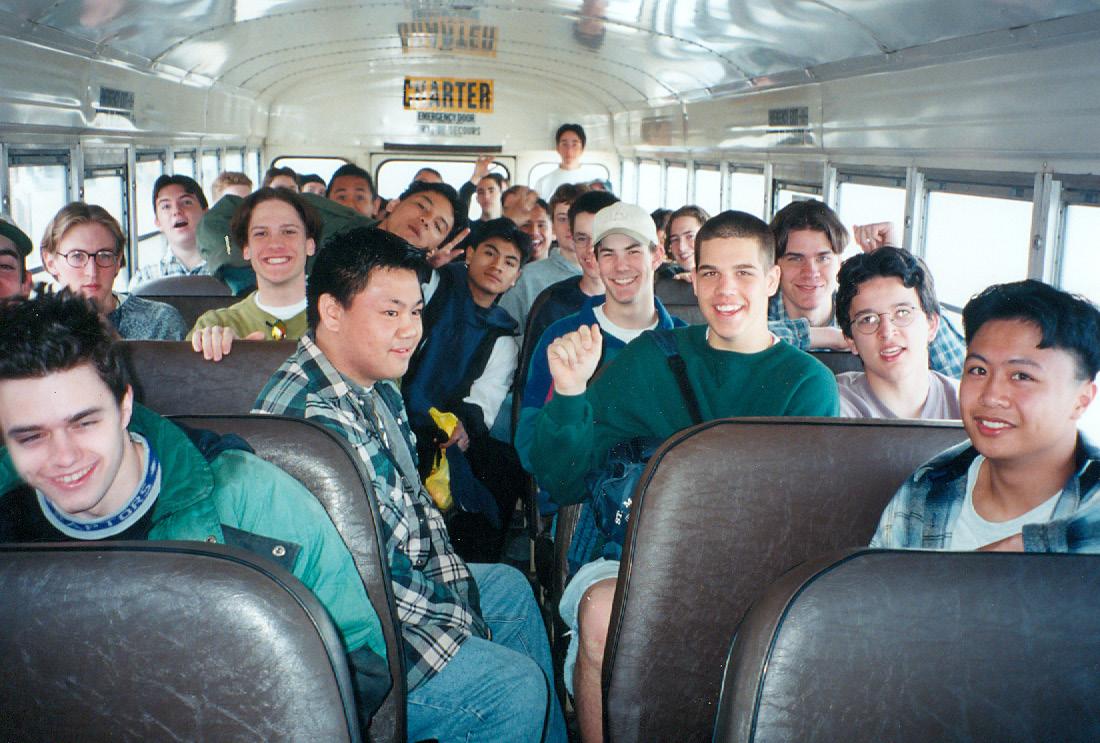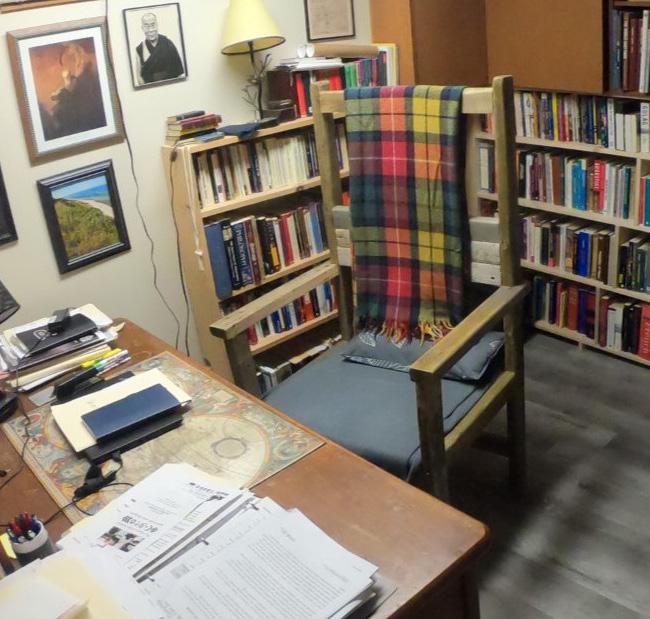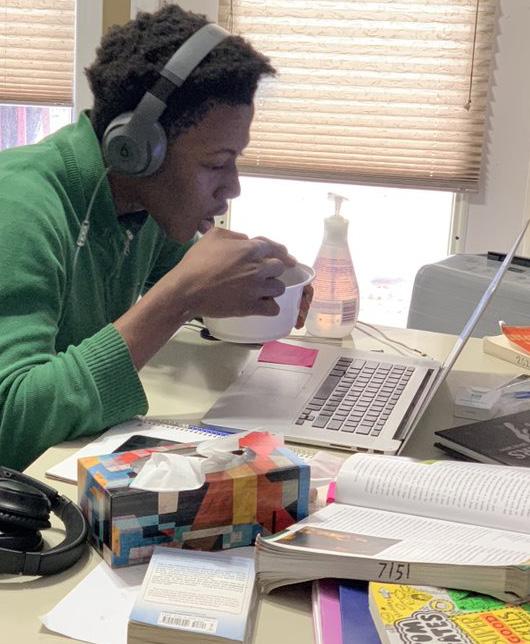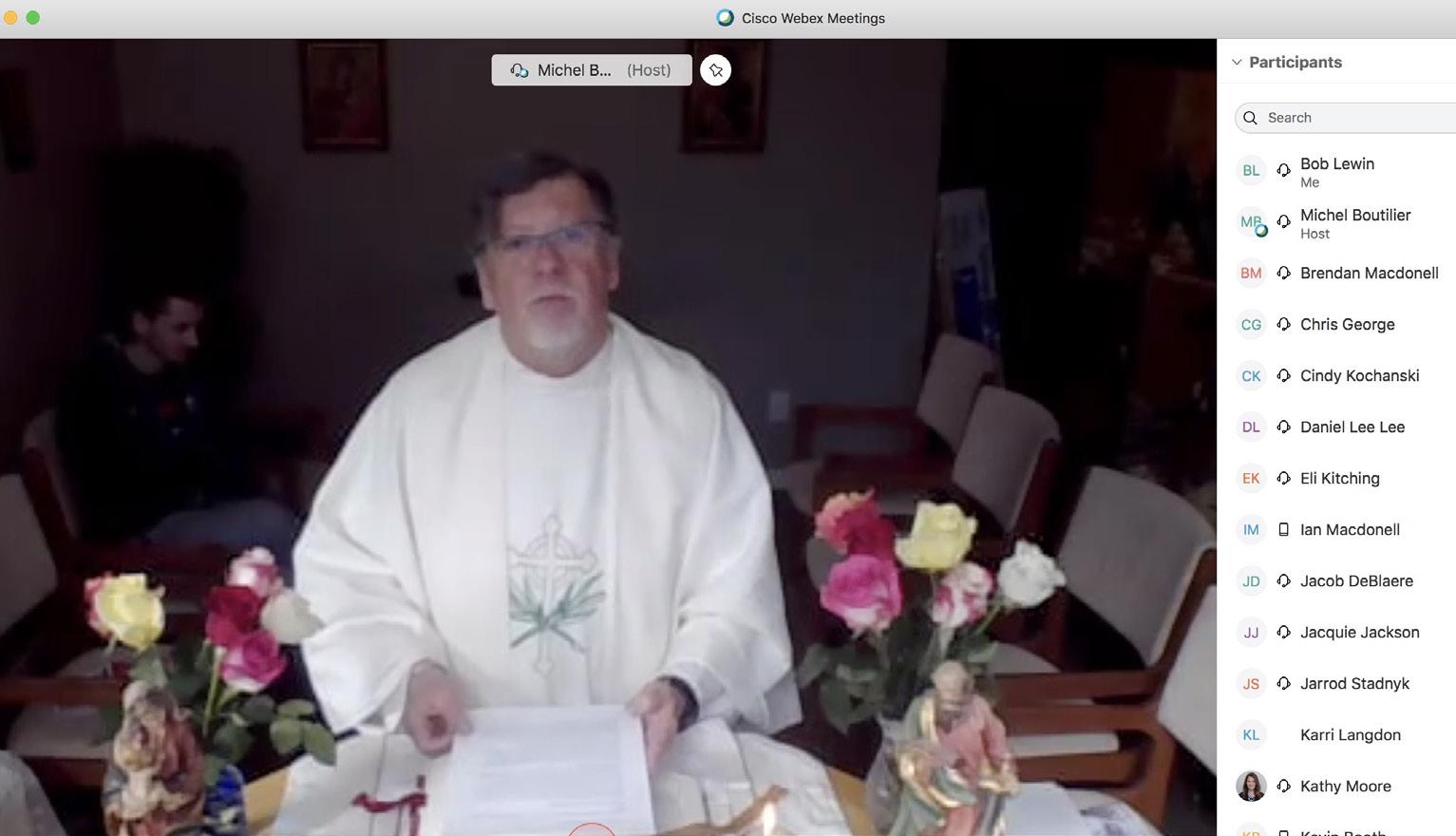
7 minute read
Cover Story: Events That Shaped Us
Events that Shape Us
Epidemic to pandemic, REFLECTION on crisis by samantha eadie, archivist T he 2019-20 school year will forever be marked in the memory of St. building dikes. It was a close-run thing: peak flow was actually 6% higher Paul’s High School. As a result of the COVID-19 pandemic, the school, it’s than the Floodway’s designed capacity. students, faculty, and community have had to adapt to new ways of learning, socializing, and practicing faith. To make up for lost educational time, we substituted classes for the usual exam period, a popular This article will reflect on the experiences of our community during the decision for many but COVID-19 pandemic and two other significant events in our history, the 1953 less so for exemptees! Polio Epidemic and the 1997 Flood of the Century.
1953: Polio Epidemic The worst polio epidemic in Manitoba’s history arrived in the summer of 1953. Thousands, primarily children, were infected by the crippling disease. To combat the spread of polio and protect the most vulnerable, the Province delayed the beginning of the 1953-54 school year and cancelled all school athletic activities.
Reflection by Frank Mayda ‘54
Mr. Frank Mayda was a student at St. Paul’s College during the 1953 epidemic. When Canadian polio epidemics peaked in 1953, St. Paul’s College emerged unscathed. According to Frank Mayda, a 1954 SPC graduate, the school was only minimally affected by the epidemic. The provincial restrictions placed on the school and sporting activities were the main impact. These restrictions left Mayda unable to participate in intramural football and delayed the start of his graduating year. Many of his schoolmates would have also lamented the cancellation of the City League football season. Mayda’s primary memory of the epidemic was a method of treatment used. He recalls that a serum (likely gamma globulin) was given to reduce the risk of contracting the virus. This method was replaced by the Salk vaccine in 1955.
1997: Flood of the century Flooding in the Red River Valley is an annual event as rivers often rise in the spring. 1997 was no different until an April blizzard hit. The already high waters and late snowfall caused the Red River to swell. The water spread across the valley and swallowed the land. This natural disaster is known as the Flood of the Century.
Reflection by Johnston Smith ‘67
Mr. Johnston Smith was the principal of SPHS in 1997. School closed for a day in early April 1997 as Winnipeg shoveled out from a Colorado Low. This was trouble as the flood forecast was already grim. By April’s final week, the Floodway had reached capacity. When the call went out for volunteers to sandbag, the school co-ordinated senior student volunteers to assist in low-lying riparian areas in and around the city. Classes continued for the younger students. VP Kevin Booth and teacher Ron Vanderhooft led the teacher supervisors while VP Brian Murphy managed other school affairs and I dealt with co-ordinating the support efforts and community relations. For several weeks our students worked 9-5
Reflection by David Havixbeck ‘97
Mr. David Havixback, currently a teacher at SPHS, was a Grade 12 student in 1997. Q: What do you remember most about the Flood of the Century? STUDENT FLOOD VOLUNTEERS A: I was in Grade 12. I’m pretty sure what they said is that Grade 12s could just go, as long as they were sandbagging somewhere… It was up to us to decide where to go… Sometimes we went south. Sometimes we were within the city… I remember…there were times that maybe it was more coordinated by the school. Q: How did the Flood affect your school year? A: We didn’t have much for classes because we were allowed to go sandbag. Now, I’m not sure if that was extended all the way to Grade 9s and 10s or if it was just 11s and 12s that were allowed. Q: What did you take away from living through this event as a student? A: I mean, you go out and you help when needed or do things when you really need to get out of the class and do something.

2020: Covid-19 pandemic
Reflection by Bob Lewin
Mr. Bob Lewin is the current principal at SPHS. Q: How has COVID-19 impacted the school year? A: COVID-19 resulted in an indefinite suspension of classes and the need to develop a plan to continue teaching and learning remotely. Closing schools to students has also meant canceling extracurricular activities, cutting sports seasons short, and postponing or canceling other important school events. Grade 12 students and their families have had additional challenges. Q: How has the school responded to the pandemic? A: The school decided to suspend classes before the official announcement from Manitoba Education. This early closure allowed teachers to begin preparing for online delivery and participate in training as we moved to remote teaching and learning. Teachers, counselors, and administrators have found new ways to support one another and the students and parents in our community. We have worked together to find ways to sustain and build up our community during the requirements for social distancing. Q: What do you believe the long-term effects of the pandemic will be? A: I believe our community will be even stronger than it is today. While it may take time to return to regular school routines and a new normal, the Crusader spirit remains alive and well. I believe St. Paul's will have a renewed sense of mission. We will feel more grateful for the opportunities we have each day – to learn, to laugh, to teach, to be in communion with one another – to be Crusaders! Q: As principal, what will you take away from this event?
A: The importance of family and my sense of belonging at St. Paul’s have increased because of my interactions with colleagues, students, parents, friends, and family members throughout the pandemic. I feel blessed to be at St. Paul’s!
Reflection by Ian Macdonnell ‘20
Ian MacDonnell is currently a Grade 12 student at SPHS. Q: How has COVID-19 affected the school year for you? A: It cut my senior year short. I lost the opportunity to do so many things such as, senior prank, last day, last practice, last game on Connolly. It has left me with a feeling of emptiness. The last 3 years I have looked forward to my senior year and making it the best one yet! Q: What has your at-home learning experience been? A: It is different. I love being at home with my family. It has given me more time to reflect on my life for the last 3 years. I love seeing my friends on Webex and my teachers. I would not have enjoyed my time as much as I did if it weren’t for them! Even from home they are still encouraging us to be the best people we can! And that’s a huge reason for who I am today! Q: What do you miss most about going to school? A: The atmosphere for sure. St. Paul’s has a feeling as if it is a big family. I looked forward to my everyday interactions with everyone. I was super blessed to be on multiple sports teams and to have so much family in the school right now which has helped me connect with all grade levels. I miss the feeling of being an older brother and someone who the younger guys could look up to. I hope I carry myself in a way that resembles the type of men St. Paul’s helps create. I miss the smiles and constant jokes between teachers and students. Q: How do you think this experience will influence your life moving forward? A: This experience will make me think twice about taking things for granted. Throughout grades 9 to 11 I spent so much time wishing I was a senior “one of those cool Grade 12’s”. I feel as though I didn’t spend enough time appreciating what was happening in front of me. Now that my time has come to move on, I can’t wait to come back and support the boys!
Resiliency Reflecting on the events of the past, the determination and perseverance of the Crusader spirit becomes apparent. As the COVID-19 pandemic becomes part of our history, it too will serve as an example of this spirit and how our community is able to survive these defining events.
"We must hope and expect great things from God, because the merits of our Lord belong to us; and to hope much in God is to honour him much. The more we hope, the more we honour him. " ~Louis Lallemant, S.J.
GRADE 12 VIRTUAL MASS DR. ROBERT PUCHNIAK '89 TEACH FROM HOME OFFICE



IAN MACDONNELL '20 OUTSIDE HIS HOME DURING COVID










